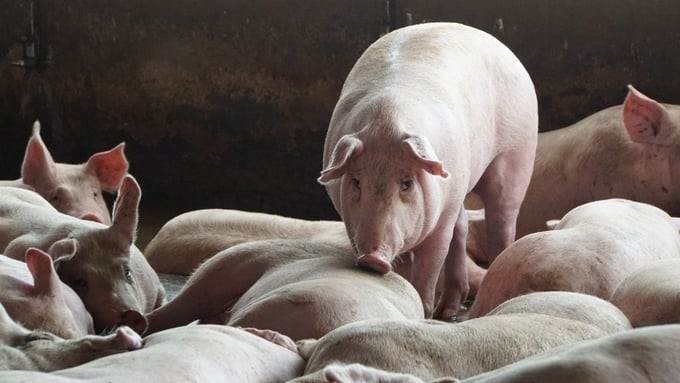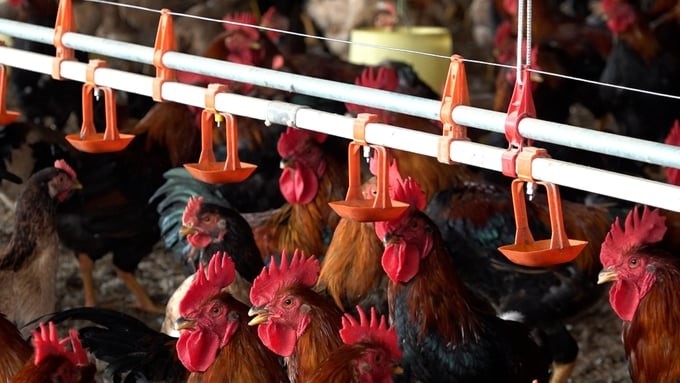May 21, 2025 | 08:12 GMT +7
May 21, 2025 | 08:12 GMT +7
Hotline: 0913.378.918
May 21, 2025 | 08:12 GMT +7
Hotline: 0913.378.918

Since the beginning of 2024, the animal disease situation has become complicated. Photo: Hong Tham.
On July 2, the Ministry of Agriculture and Rural Development (MARD) issued Official Dispatch No. 4687/BNN-TY to the People's Committees of provinces and municipal cities on focusing on drastically and synchronously implementing solutions to control, prevent, and combat diseases in the livestock herd.
The Official Dispatch stated that, in the face of increasingly complicated developments of animal diseases, especially avian influenza, rabies, African swine fever, foot-and-mouth disease, and lumpy skin disease, on June 16, 2024, Prime Minister Pham Minh Chinh issued Official Telegram No. 58/CD-TTg directing Ministries, branches, and People's Committees of provinces and municipal cities to focus on synchronously, drastically, and effectively implementing solutions to prevent and control cattle and poultry diseases.
In order to thoroughly grasp and timely and effectively implement the Prime Minister's direction in Official Dispatch No. 58/CD-TTg mentioned above, on June 17, 2024, MARD organized a conference to deploy solutions to prevent and control cattle and poultry diseases in the last months of 2024.
Attending the conference were leaders of the Provincial People's Committee, the Department of Agriculture and Rural Development, veterinary management agencies from 63 provinces and cities, associations, businesses, and media agencies.
Based on the in-depth analysis reports of specialized agencies under the Ministry and the opinions of participating delegates that clarified the shortcomings, causes of the wide spread of diseases, and solutions to overcome them, MARD requests the Chairman of the People's Committees of provinces and cities to pay attention, prioritize focusing all resources, and directly direct local departments, branches, and governments at all levels to rectify and drastically and synchronously implement solutions to control, prevent, and combat animal diseases in accordance with the provisions of the Law on Veterinary Medicine and especially the documents guiding the implementation of the Law. Of which, focus on immediately implementing the following measures:
For localities that have had or are currently experiencing animal diseases: Implement the declaration of diseases at district and provincial levels and organize disease prevention according to regulations, ensuring the complete handling of outbreaks, not letting new outbreaks arise, and not letting the disease persist and prolong. Request to review and handle the responsibilities of relevant collectives and individuals who fail to promptly advise, direct, and deploy disease prevention according to regulations.
Urgently approve and promptly allocate funds, chemicals, and vaccines, and support district and commune-level governments and local specialized agencies at all levels to: organize disease prevention; handle and destroy animals that are diseased, suspected of having diseases, or dead due to animal diseases.
Promptly detect, prevent, and strictly handle cases of selling, trading, transporting animals diseased or suspected of having diseases, and throwing dead animal carcasses into the environment, causing disease spread and environmental pollution.
Temporarily stop animal slaughter and tighten the management of animal slaughter in areas where diseases are occurring according to regulations. Organize general cleaning, sterilization (with chemicals, lime powder, etc.), and disinfection at each livestock facility with diseases at the village, hamlet, and commune levels where the disease is occurring and adjacent high-risk areas.
Buy vaccines centrally to organize vaccination to surround outbreaks; vaccinate in high-risk localities, especially for avian influenza, rabies, African swine fever, foot-and-mouth disease, lumpy skin disease, etc. Provide daily information and disseminate information about diseases and disease prevention and control measures.
For all localities nationwide: Guide livestock farmers to strictly apply daily hygiene and disinfection measures with lime powder and chemicals in the barn area and surrounding areas. Request and take measures to ensure that owners of livestock households and livestock facilities that have animals forced to be destroyed due to diseases fully carry out sterilization, sanitation, and disinfection to destroy pathogens and not let the disease spread.
Organize accurate statistics of the total livestock herd and, based on the disease situation, circulating pathogens, and disease risks, recommend the use of vaccines by the Department of Animal Health to implement mass vaccination for phase II/2024.
At the same time, review revaccination and additional vaccination for new livestock herds or those that have been vaccinated but have expired or are about to expire the immunity time. Of which, focus on and prioritize vaccination against African swine fever for pig herds, avian influenza, rabies, foot-and-mouth disease, and lumpy skin disease, ensuring at least 80% of the total livestock herd at the time of vaccination .
Organize surveillance to proactively detect diseases in livestock herds to promptly warn and thoroughly handle when new diseases are discovered on a small scale. Strictly handle cases of not reporting diseases, selling or slaughtering diseased animals, animals suspected of having diseases, and throwing animal carcasses into the environment, leading to disease spread.
Report promptly, fully, and accurately data on the disease situation, results of disease surveillance, vaccination, facility management, and disease-free zones; and strictly implement reporting on the Viet Nam Animal Health Information System (VAHIS).

Localities need to instruct livestock farmers to increase the application of hygiene and disease prevention measures for livestock. Photo: Hong Tham.
Organize the construction of disease-free livestock facilities and areas, including disease-free facilities and areas to serve the export of animals and animal products.
Strengthen quarantine management, control of transportation of animals and animal products, and control of animal slaughter; especially prevent and strictly handle cases of illegal transportation of animals and animal products.
Review and adjust the local cattle and poultry disease prevention and control plan in 2024 to suit the actual situation; Urgently complete and submit to competent authorities for approval of funding to proactively and promptly deploy all contents of National Programs and Plans to prevent and control animal diseases for avian influenza, rabies, African swine fever, foot-and-mouth disease, and lumpy skin disease in 2025 and following years.
Well organize the information and dissemination work for livestock owners and the community about the risks and harmful effects of dangerous diseases on livestock. Instruct livestock farmers to increase the application of hygiene and disease prevention measures for livestock; Disseminate vaccination and the benefits of vaccination. Build disease-free livestock facilities and areas; Proactively handle diseases thoroughly when they are newly discovered. Strictly handle cases of hiding diseases and slow reporting that lead to disease spread.
Establish working groups in key localities for livestock farming and diseases to guide, inspect, and urge the prevention and control of cattle and poultry diseases. Especially, inspect and rectify the work of vaccination; proactively monitor closely the disease situation, ensuring early detection, warning, and directing thorough handling of outbreaks and preventing the disease from spreading widely.
Urgently consolidate and strengthen the capacity of the veterinary system at all levels according to the provisions of the Law on Veterinary Medicine 2015, under the directions of the Politburo, Secretariat, National Assembly, Government, and Prime Minister (Decision No. 414/QD-TTg dated March 22, 2021, Decision No. 889/QD-TTg dated July 25, 2023, Directive No. 29/CT-TTg dated December 6, 2023, and Official Telegram No. 58/CD-TTg June 16, 2024) to ensure resources to effectively deploy the tasks of animal disease prevention and control, preventing smuggling and illegal transportation of animals and animal products.
Promote the application of information technology, digital transformation, and administrative reform in animal disease prevention and control, quarantine, animal slaughter control, and veterinary medicine management.
Translated by Thu Huyen

(VAN) Dong Thap farmers attained an average profit margin of 64% during the summer-autumn 2024 crop (first season), while An Giang and Kien Giang farmers followed with 56% and 54%, respectively.

(VAN) As a doctoral student doing research on renewable energy and electrification at Harvard University, the author shares his musings on electricity, nature, and countryside memories.

(VAN) The decree on Extended Producer Responsibility (EPR) ensures transparent management and disbursement of support funds, avoiding the creation of a “give-and-take” mechanism.

(VAN) Hue City rigorously enforces regulations regarding marine fishing and resource exploitation, with a particular emphasis on the monitoring of fishing vessels to prevent illegal, unreported, and unregulated (IUU) fishing.

(VAN) Hanoi People's Committee has issued a plan on reducing greenhouse gas emissions in the waste management sector with 2030 vision.

(VAN) Vietnam's draft amendment to Decree No. 156 proposes a mechanism for medicinal herb farming under forest canopies, linking economic development to population retention and the sustainable protection and development of forests.

(VAN) In reality, many craft village models combined with tourism in Son La have proven effective, bringing significant economic benefits to rural communities.